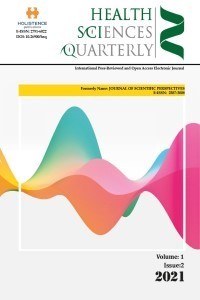EFFECTIVENESS OF NON-PHARMACOLOGICAL COMMUNITY-BASED NURSING INTERVENTIONS FOR SMOKING CESSATION IN ADULTS: STUDY PROTOCOL OF A SYSTEMATIC REVIEW
Tobacco use is one of the common and preventable risk factors of non-communicable diseases. Although the smoking rates tends to be decreased thanks to universal policies, it still is not satisfactory, especially among the middle-aged individuals. In order to achieve success in smoking cessation activities, it is crucial to determine the most effective nursing interventions and apply them into the practice. The objective of this systematic review is to investigate the effectiveness of non-pharmacological community-based nursing interventions for smoking cessation on cessation rate, non-relapsing rate, knowledge belief and attitude related to smoking in adults living in the community. PubMed, Cochrane Library, EMBASE, PsycINFO, Cochrane Central Register of Controlled Trials (CENTRAL), EBSCO, ProQuest, Academic Search Complete, Ovid, CINAHL Plus with Full Text, MEDLINE, Web of Science, Scopus, Turkish Council of Higher Education Thesis Center, Ulakbim Turkish Medical Database and Turkiye Citation Index were searched. Databases were searched from the 1st of January 2008 to the 31st of December 2017. Languages were Turkish and English. The protocol of this systematic review was registered to PROSPERO database. The registration number is CRD42018088007. The study is ongoing. The databases were searched and 796 studies were retrieved in total. Data extraction process is ongoing. The data to be gathered from this systematic review is predicted to be a source for both primary care nurses and the other primary care professionals in terms of the effective smoking cessation method, its duration and changes in knowledge belief and attitude of individuals. The smoking cessation interventions were performed actively by primary care nurses, will facilitate to reach both local and global targets for preventing the non-communicable diseases. It is also aimed to contribute to nursing education curriculum by revealing the roles and influence of primary care nurses on smoking cessation promotion.
Keywords:
adult community health nursing, smoking cessation, primary care.,
___
- 1. WHO. Global action plan for the prevention and control of non-communicable diseases 2013-2020. WHO Library Cataloguing-In-Publication Data. 2013:1-52.
- 2. Jamal A, Phillips E, Gentzke AS, et al. Current Cigarette Smoking Among Adults - United States, 2016. MMWR Morbidity and mortality weekly report. 2018;67(2):53-59. doi: https://doi.org/10.15585/mmwr.mm6702a1
- 3. WHO. WHO global report on trends in prevalence of tobacco smoking 2000-2025. 2nd ed. Geneva: World Health Organization; 2018.
- 4.TUIK. Türkiye Sağlık Araştırması-2016. 2017; http://www.tuik.gov.tr/PreHaberBultenleri.do?id=24573. Accessed 4th June, 2017.
- 5. Asma S, Mackay J, Song S, et al. The GATS Atlas. Atlanta, GA: CDC Foundation; 2015.
- 6.TCSaglikBakanligi. Ulusal Tütün Kontrolü Eylem Planı 2015-2018. 2015; http://www.havanikoru.org.tr/dosya/eylem_plani/ulusal-tutun-kontrol-programi-eylem-plani.pdf. Accessed 4th July, 2017.
- 7.Chen D, Wu LT. Smoking cessation interventions for adults aged 50 or older: A systematic review and meta-analysis. Drug and Alcohol Dependence. 2015;154:14-24. doi:https://10.1016/j.drugalcdep.2015.06.004
- 8.Byers MA, Wright P, Tilford JM, Nemeth LS, Matthews E, Mitchell A. Comparing Smoking Cessation Outcomes in Nurse-Led and Physician-Led Primary Care Visits. Journal of Nursing Care Quality. 2018;33(3):272-278. doi:https://10.1097/NCQ.0000000000000296
- 9.Hughes JR, Naud S. Perceived role of motivation and self-efficacy in smoking cessation: A secondary data analysis. Addictive Behaviors. 2016;61:58-61. doi:https://doi.org/10.1016/j.addbeh.2016.05.010
- 10.Moura M, Menezes M, Mariano R, Silva V, Sousa L. Nursing interventions on tobacco control: An integrative review. Revista Brasileira de Cancerologia. 2011;57(3):411-419.
- 11.Elshatarat RA, Yacoub MI, Khraim FM, Saleh ZT, Afaneh TR. Self-efficacy in treating tobacco use: A review article. Proceedings of Singapore Healthcare. 2016;25(4):243-248. doi:https://doi.org/10.1177/2010105816667137
- 12.Nichter M, Carkoglu A, Nichter M, Ozcan S, Uysal MA. Engaging nurses in smoking cessation: Challenges and opportunities in Turkey. Health Policy. 2018;122(2):192-197. doi:https://10.1016/j.healthpol.2017.12.007
- 13.Sarna L, Bialous SA, Chan SS, Hollen P, O’Connell KA. Making a difference: Nursing scholarship and leadership in tobacco control. Nursing Outlook. 2013;61(1):31-42. doi:https://doi.org/10.1016/j.outlook.2012.05.007
- 14.Rice VH, Hartmann-Boyce J, Stead LF. Nursing interventions for smoking cessation. The Cochrane database of systematic reviews. 2013(8):Cd001188. doi:https://10.1002/14651858.CD001188.pub4
- 15.Rice VH, Heath L, Livingstone-Banks J, Hartmann-Boyce J. Nursing interventions for smoking cessation. The Cochrane database of systematic reviews. 2017;12:Cd001188. doi:https://10.1002/14651858.CD001188.pub5
- 16.Zbikowski SM, Magnusson B, Pockey JR, Tindle HA, Weaver KE. A review of smoking cessation interventions for smokers aged 50 and older. Maturitas. 2012;71(2):131-141. doi:https://10.1016/j.maturitas.2011.11.019
- 17.Shamseer L, Moher D, Clarke M, et al. Preferred reporting items for systematic review and meta-analysis protocols (PRISMA-P) 2015: elaboration and explanation. BMJ. 2015;349:g7647. doi:https://doi.org/10.1136/bmj.g7647
- 18.Thomas BH, Ciliska D, Dobbins M, Micucci S. A process for systematically reviewing the literature: providing the research evidence for public health nursing interventions. Worldviews on evidence-based nursing. 2004;1(3):176-184. doi:https://doi.org/10.1111/j.1524-475X.2004.04006.x
- 19.Ergin E, Akın B. The Turkish adaptation of a quality assessment tool for quantitative studies: validity and reliability analyses. Turkiye Klinikleri Journal of Nursing Sciences. 2018;10(4):292-308. doi:https://10.5336/nurses.2018-61334
- Başlangıç: 2017
- Yayıncı: Holistence Publications
Sayıdaki Diğer Makaleler
Filiz BAL KOÇYİĞİT, Cihan TURHAN, Ece DİNÇ, Barış KOÇYİĞİT
Mehmet Can DEMİR, Cengiz TEPE, İlyas EMİNOĞLU
Yunus Emre TOPDAĞI, Şamil ÖZTÜRK, İlhan ÖZDEMİR, Suat ÇAKINA
